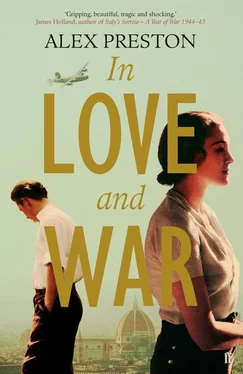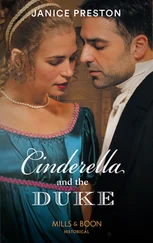Creighton has supplied him with blocks of plastic explosives, small and wrapped in brown paper. He looks up the tracks towards the station, where an elderly woman is sweeping dust into desultory clouds. The hillsides around are thickly wooded. Even though the sun is now rising above the high mountains in the east, he is still in shadow. He darts to the rails, presses the packages of explosives like nougat into hollows he digs out of the stones beneath and around the tracks. He checks the connections and plays out the fuse, concealing himself in the dark shade of a pine tree a little further up the hill.
He looks at his watch. The train is late. He lights a cigarette and stares up through the branches to the blue air above. Sometimes, in the moments of calm, he is seized by a lightness of spirit that feels almost crude without Ada beside him. He can hear birdsong, the plash and spatter of the rocky Arno, and now, in the distance, the whispering rattle of the approaching train. He carefully stubs out his cigarette and gives a last glance up to the sky.
The information is never certain. He relies on messages from mouth to mouth, passed behind menus in noisy restaurants, or in snatched conversations in the lanes of Milan or Turin, through the bars of a gaol at night. The messages are written on slips of paper and sewn into the lining of jackets, or swallowed and fastidiously retrieved, or dropped from moving cars. In the fading echoes of these whispers it is suggested that a certain person, or group of persons, will be in a particular place at a particular time. And he must go and kill them there.
Thus in theory, Creighton had told him, in the second and third carriages of the train now coming towards him are eighteen members of the SS Einsatzgruppen — the death brigade that would be responsible for rounding up the remaining pockets of resistance in Florence, shepherding the last Jews, gypsies and Communists into the slatted wagons at Santa Maria Novella, executing any who stood in their way. A decent target, Esmond thinks.
He can see the train coming around the bend towards the station. His view of the carriages telescopes as the track uncurves and he is left with only a front-on picture of the locomotive, the driver dimly visible in the cab. The woman has stopped sweeping and is leaning on her broom, exchanging a few words with the driver through the steam. The train lets out a whistle and begins to pull away from the station and towards him. Esmond flicks open his IMCO and lights the fuse, which hisses its snaking path down towards the tracks. He scurries further up and raises a pair of field glasses to his eyes. The high wheeze of the engine as it gathers speed. A sudden, incongruous burst of birdsong as the sun breaks over the nearest hills and illuminates the valley. Almost, almost, the train is there.
The locomotive passes over the nest of explosives. The first carriage, in the windows of which he sees two young men in fedoras, smoking, a woman at her knitting. The second carriage, which is empty. The third. Not eighteen, but five slate-suited German officers. Their carriage passes over the explosives. He’s misjudged the length of the fuse, or the damp air has snuffed out the flame. He pulls out his revolver and takes aim. Now the fourth and penultimate carriage, also empty, rolls over the brown packages of nitroglycerine. Nothing. He raises his revolver, closes one eye, aims at the brown packages. A crack, a split-second of vacuumed air and everything stops, then with a roar like a living beast the tracks rear up from the earth.
A wave passes along the train’s long steel spine and the carriages buck from the rails, forming a jagged W before the locomotive plunges down the hill and into the Arno. It comes to rest in the roiled water, steam still rising from the engine. The woman on the station platform has dropped her broom, raising her hands to her mouth. The birds have stopped singing. He doesn’t wait to see who — if anyone — crawls from the capsized train. He doesn’t think of the driver, or the woman, or the young men in the first carriage. Or passengers who may or may not have been in the last. He gets back on his motorbike and lights a cigarillo, pulls the goggles down over his eyes and takes off up the hill, a hard knot of satisfaction in his chest.
Esmond feels his energy grow until he can barely sleep, and sits all night in the cool moistness of the cave thinking of Ada, recalling their moments of love. He pictures her in the studio, frowning over a desk of knobs and dials; he sees her in their bed at L’Ombrellino, Tatters tummy-up beside her, afternoon light slanting into her hair; then he sees her broken, sees her fighting, calls to his mind that last look between them, the little shake of the head. These memories tie a wire around his heart. Tosca and Antonio look at him as if he were a stranger now, Bruno and Elio struggle to keep up.
Maria Luigia is captured in a building on the Piazza Vittorio Emanuele on the 13th of May. The radio is discovered and destroyed. Less than a month later she is murdered by a firing squad in the yard of the Murate prison. Her body is returned to her cousins in the country and Esmond goes with Elio, who is undone, to stand in one corner of the graveyard of Porte Sante, in the shadow of a row of cypresses, and look across as her coffin is lowered into the earth. Her family wring and crumple on the cusp of the grave; the priest a magpie, hopping nervously, aware of the shadowy figures watching, some friendly, some not. Esmond and Elio leave quickly, before the end, by scrambling over the cemetery wall, down the steps in front of San Miniato al Monte, and into the waiting Bianchi. When they get back to the cave, Elio goes to sit in front of the paintings. For all of them now, this has become a place of retreat. They can sense the end of things — disaster, victory, resolution — and they contemplate the two saints, together into the night, a sense of shared purpose stringing between them.
News of the fall of Rome reaches them in early June. The front is so close that Esmond fancies, lying in the cave at night, that he can feel the breath of English soldiers on his skin, the rumble of their marching feet in the rocks beneath. Soon afterwards, Pretini is released by Carità. The Professor brings him up the mountain to see them. The hairdresser’s face is unrecognisable, his mouth a twisted empty snarl without its teeth. He has lost an eye and the socket weeps yellowish fluid. His nose is flattened against his face. He tells them, calmly and clearly, about his time in the anonymous-looking building on the via Bolognese, of walls lined in spikes, the carefully reconstructed version of the strappado — a medieval torture device — the cat’s paws and crocodile shears and whips and thumbscrews. He tells them of Carità applying electric shocks to his gums, to his ears, to his genitals, while Father Idelfonso played Schubert’s Unfinished Symphony on the piano to drown out his screams. He tells them of the mock executions where a gun was placed against his temple and the trigger pulled, and how each time he was sure it was loaded, and the peace that came with that. Two Serbians that were captured by Carità have also been returned alive; blind, castrated, their tongues cut out, but alive. Bruno drives them to the nuns at Prato where Morandi, his doctor friend, does his best to make them human again.
The mention of Morandi brings Ada closer. He remembers the doctor’s words — She gave birth, you know . He thinks of the child that never was, the life that might have been. How much would he have loved that baby, knowing that half of it was her? That evening, alone, he sits in front of the paintings, very close, so that he can see their ancient crazing, and rearranges the bright, broken pieces of memory, the chaos of vague possibilities that was their child. Someone said — St Augustine, he thinks — that memory is a place of palaces and caverns. His is only caverns now.
Читать дальше












